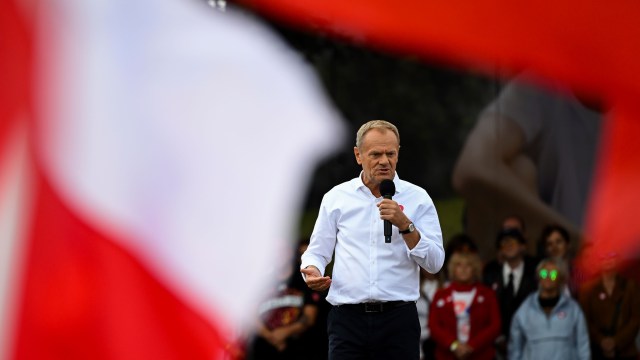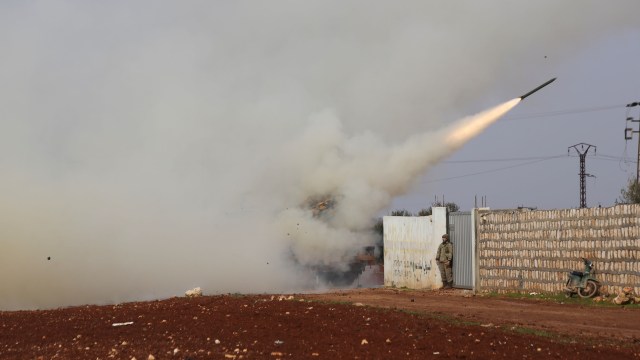Daily Review: A Bitter Power Struggle in Bolivia – World Politics Review
Today at WPR, we’re covering the U.S.-France divide on secularism, Poland’s upcoming elections and the geopolitics of the Broadway musicals “Evita” and “Here Lies Love.”
But first, here’s our take on today’s top story:
Bolivia: President Luis Arce has been expelled from his own party, the ruling Movement Toward Socialism (MAS), in the latest episode of a bitter power struggle between him and former President Evo Morales. The move follows Morales’ recent announcement that he would run as the party’s candidate in the next presidential election—two years before the ballot and before MAS had even held its primary. (The Guardian)
Our Take: MAS has been the dominant force in Bolivian politics for almost two decades, meaning that this feud has significant implications in the short term, for the basic functioning of the government, and in the long term, for the election in 2025 and beyond.
In the short term, the Arce-Morales rivalry has already led to some institutional paralysis in the government and, as the rift widens, will likely lead to more. It’s a particularly bad time for paralysis, as the Bolivian government was already struggling to combat a range of economic challenges and has yet to find an alternative economic model to its reliance on income from gas exports, which peaked in 2013 and continue to fall.
Get the Daily Review sent straight to your inbox every weekday.
In the long term, Bolivian politics may be further upended in the run-up to the 2025 election, especially if Arce decides to run against Morales. In that scenario, Arce and Morales could very well end up splitting MAS—and in 2025, splitting the vote.
Meanwhile, the country has yet to resolve the lingering fault lines that resulted from Morales’ ouster in 2019, when he ran for a third consecutive term in violation of the constitution. Since then, both the interim government led by the political opposition and the subsequent MAS government under Arce have weaponized the courts, targeting each other with what many observers consider to be politically motivated judicial proceedings.
Bolivia, to be sure, is a relatively small country with little influence regionally. But it does have vast, largely undeveloped lithium reserves with huge potential value for both the Bolivian economy and the global green transition, meaning that political instability there has global implications. And with Arce and Morales on a collision course amid the country’s broader political fracture, instability seems like a near-certainty.

Predictably, the decision set off another round of trans-Atlantic disputes over the meaning of freedom of religion and the best way to guarantee it, with Americans accusing the French state of infringing on the rights of its Muslim citizens and the French accusing Americans of not understanding the nature of French secularism, or laïcité.
The belief that the two countries have radically different approaches to secularism and the separation of church and state is now widespread, deeply entrenched—and wrong. As WPR Editor-in-Chief Judah Grunstein writes, the source of this dispute actually emerged relatively recently.
A Visa Bribery Scandal Could Upend Poland’s Elections
Poland heads to the polls on Oct. 15 for legislative elections, with the ruling Law and Justice, or PiS, party favored to win. The right-wing nationalist juggernaut has held power for nearly a decade, during which it has undermined Poland’s democracy and its compliance with the EU’s norms on rule of law.

With just 10 days left, though, PiS is facing unexpected headwinds that could erode its support and threaten its ability to craft a majority in parliament. In a jaw-dropping irony, the party, which like other nationalist populist parties in Europe often appeals to anti-immigrant sentiment, is now embroiled in a scandal over selling visas to migrants from Asia and Africa, Frida Ghitis reports.

Good Broadway Musicals Make for Bad Global South History
There are a lot of obvious similarities between the musicals “Here Lies Love” and “Evita.” Both tell the stories of famous first ladies—the former focusing on Imelda Marcos of the Philippines, the latter on Eva Peron of Argentina. Both are also being performed in high-profile productions right now, with “Here Lies Love” playing on Broadway and “Evita” performing in Washington.
They both also face the same dilemma, WPR assistant editor Jakob Cansler writes, when it comes to engaging with the histories and politics of countries in the Global South.

We want to hear your take on the issues we cover. We’ll select one person from those who answer the question below to receive a free one-month extension of their WPR subscription.
This week’s question: In return for normalizing relations with Israel, Saudi Arabia is demanding a U.S. security guarantee and assistance on its nuclear energy program. Should the U.S. meet those demands?

The third summit of the European Political Community—a pet project of French President Emmanuel Macron that brings together all of Europe’s democracies—is taking place today in Granada, albeit with two notable absences: the presidents of Azerbaijan and Turkey.
The snub by Azerbaijan and Turkey highlights the limits of the grouping. The European Political Community aims to be as inclusive as possible by not taking a stand on difficult issues—like the standoff between Armenia and Azerbaijan. As Judah Grunstein wrote last year, though, that inclusivity can be a source of weakness when it comes to achieving anything.

Oct. 8, 2022 | French President Emmanuel Macron’s pet project, the European Political Community, held its inaugural summit in Prague this week. Read more.
Turkey has said that all Kurdish militant facilities in Syria and Iraq are valid military targets after two attackers who entered the country from Syria detonated bombs in front of government buildings in Ankara over the weekend. Turkey has already responded with air strikes and raids in Iraq this week.
Meanwhile, a drone attack earlier today in the Syrian city of Homs struck a graduation ceremony for military officers. Syria accused insurgents “backed by known international forces” for the attack but didn’t specify anyone in particular.
Both developments serve as reminders of how quickly the “cold war” in Syria could quickly turn hot again. As Alexander Clarkson wrote last year, the three zones of Syria each contain their own internal sources of instability and external vulnerabilities that could spark another round of brutal escalation spilling over beyond Syria’s borders.

More From WPR
Source: News
